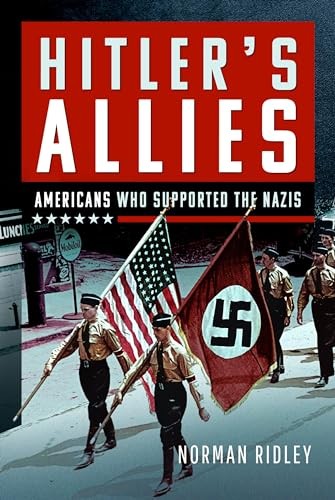Thank you to the publisher and for NetGalley, which provided me with a free copy of this book in exchange for an unbiased review.
Hitler’s US Allies, by Norman Ridley, is a good look at Hitler’s allies in the United States leading up to the US getting involved in World War II. There are chapters about German groups that remained loyal to their home country, but it still important to note that those groups were not involved in sabotage against US interests. Their support consisted of constitutionally protected political activities. There were also chapters about Americans who, for their own political reasons, supported the Nazis.
One thing that really stood out was the beginning of the chapter on William Dudley Pelley and the Silver Legion. Pelley had run for president on the Christian Party ticket in 1936. Pelley stump speech included him saying “The time has come for an American Hitler. When I’m president…I’ll do away with the Department of Justice [and form] a Christian government.” In modern day America, that first sentence would be immediately disqualifying for any candidate, so it is never openly said. But, the Republican party’s animosity towards the DOJ and the Christian nationalist movement’s desire to form a Christian government has become so normalized that the second sentence would barely raise any attention today. When Pelley ran against FDR, he was only on the ballot in the state of Washington and only got 1,598 votes (compared to FDR’s 27.757 million), but I’m sure that a Pelley running today would get much more votes (presuming he cuts the first sentence of that quote).
Mr. Book’s point in bringing that up is, while this book is historical, issues that it raises haven’t gone away. We are still dealing with them today and I see no end in sight to it.
The book immediately grabbed my attention when it started with a history of fascist movements in the US dating back to right after the Revolution through the 1930s. I just wish that it also could have concluded with a chapter about subsequent movements leading up to the present day. The lack of that chapter was one of the big weaknesses of the book.
There was a good discussion about the attempts by capitalists to recruit General Smedley Butler to their plot to overthrow the government. It didn’t go into a lot of details, but that it is also the case that historians have still never been able to piece the whole story together and the odds are against us every knowing the full story there. It is still an important part of the story and it was crucial for that to be included in the book. And Mr. Book is glad that this book added the story about Butler going to the FBI to inform them that Charles Coughlin, the priest and very famous radio star, had attempted to recruit him to try to overthrow the government of Mexico, due to their anti-Catholic positions.
Speaking of Coughlin, there is plenty about him in the book, as their should have been. And it gives me an opportunity to share one of the great little tidbits that Mr. Book learned from this book. He has been a baseball historian for more than 40 years, but had never heard the story about how Coughlin tricked the Yankees and Tigers into attending his financially struggling church and then got Babe Ruth to help raise more money in the collection plate.
The chapters on Coughlin and on the American companies doing business with Germany were easily the best parts of the book.
But, the weakness of this book consisted of what was missing, and not just my desire to have an extra chapter on subsequent historical developments. There was no discussion of the single most famous Nazi sympathizer in the US. While Charles Lindbergh’s story has been told many times, leaving him out of the book was a glaring omission. Also, I was eager to see what else I could learn about Senator Burton Wheeler and his story, especially after he was the focus of Rachel Maddow’s excellent podcast series. But, Wheeler wasn’t included in the book either. I found that to be a big omission. The book was relatively short (the PDF was under 200 pages) so it could easily have benefitted from having more meat on the bone.
While this was an enjoyable and informative book, Mr. Book’s grade does have to also reflect those omissions. He prefers to grade on a letter scale and I debated on whether this would be a B or a B+. It had the potential for an A, but the omitted material was too big an obstacle for it to overcome. Mr. Book finally decided that the text was there was informative enough for it to get a B+. Goodreads and NetGalley require grades on a 1-5 star system. In his personal conversion system, a B+ equates to 4 stars. (A or A+: 5 stars, B+: 4 stars, B: 3 stars, C: 2 stars, D or F: 1 star).
Mr. Book originally read this on May 15, 2024.


